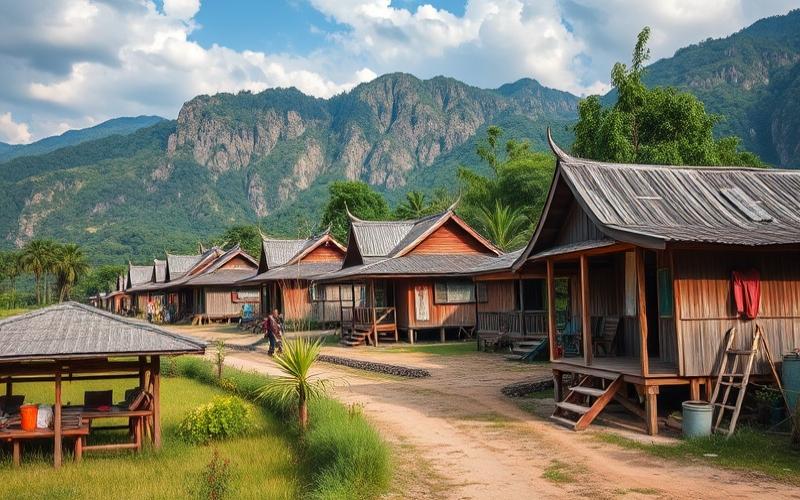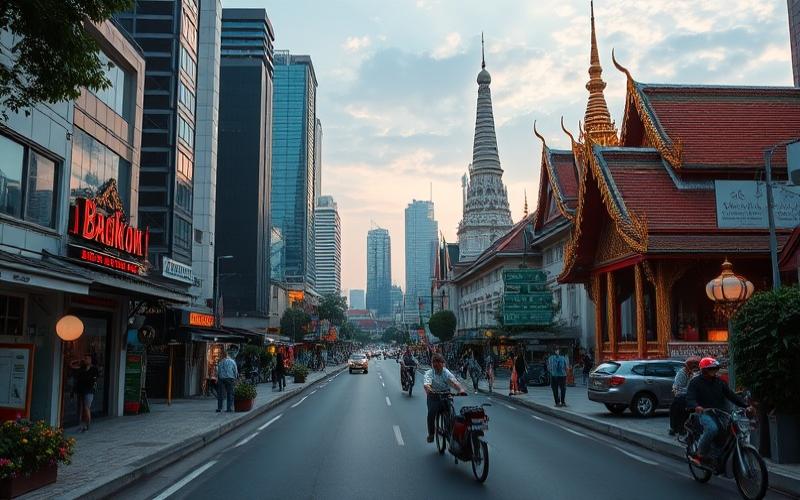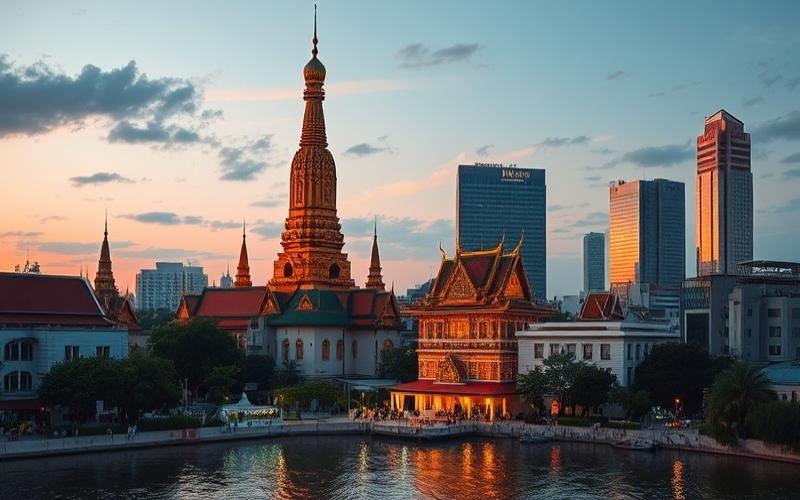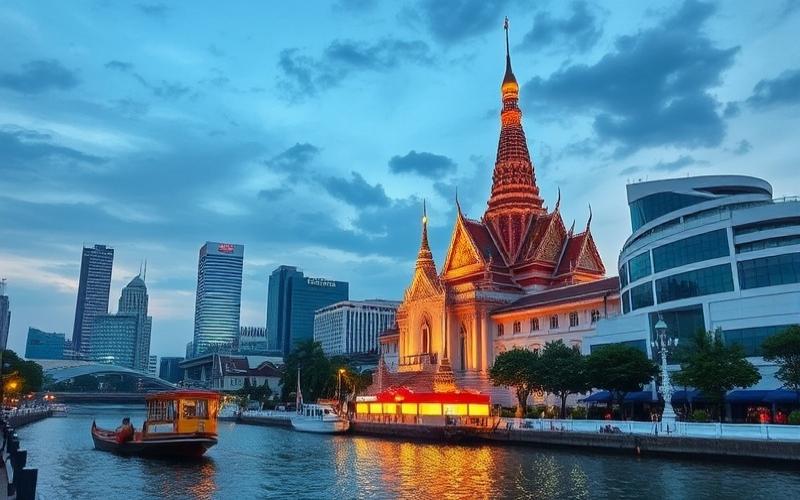
 Published on and written by Cyril Jarnias
Published on and written by Cyril Jarnias
The Rise of Digital Nomads in Thailand
The rise of digital nomads in Thailand has transformed this Southeast Asian country into a sought-after destination for mobile workers, involving notable consequences on the local rental market. Attracted by the affordable cost of living, picturesque landscapes, and vibrant culture, these digital professionals seek to harmonize their work activities with an unconventional living environment.
Good to Know:
Thailand is one of the most popular destinations for digital nomads due to its well-developed digital infrastructure and quality of life.
Impact on the Rental Market
However, their growing presence raises issues concerning the increase in rents in certain regions, influencing the economic dynamics of local communities.
Redefining the Real Estate Market
This article explores how digital nomads are redefining the boundaries of the Thai real estate market while sparking debates on urban development and housing management.
Understanding the Digital Nomad Phenomenon in Thailand
The concept of a digital nomad refers to workers who use digital technologies to perform their work remotely, allowing them to travel and live in different countries while pursuing their careers. By 2025, this lifestyle appeals to over 50 million people worldwide, characterized by a quest for freedom, flexibility, and cultural immersion.
Why Does Thailand Attract Digital Nomads?
- Affordable Cost of Living: Thailand offers excellent value for money, particularly for housing, dining, and transportation, allowing digital nomads to maintain a comfortable standard of living without spending as much as in major Western cities.
- Quality of Life: The tropical climate, cultural richness, world-renowned cuisine, and warm hospitality of the locals make Thailand a pleasant daily destination.
- Digital Infrastructure: Major Thai cities provide fast and reliable internet connections, an essential element for remote workers.
- Visa Opportunities: The new “Destination Thailand Visa” (DTV), launched in 2024, allows multiple stays over five years with renewable 180-day periods, without the traditional constraints of work permits. It is open to freelancers, startup founders, and remote employees, and extends to families.
Geographical Distribution and Popular Locations
| City / Region | Main Assets |
|---|---|
| Bangkok | Dynamic capital, numerous coworking spaces, nightlife, startup ecosystem |
| Chiang Mai | More relaxed atmosphere, low cost of living, highly developed nomadic community, many cafes and coworking spaces |
| Phuket | Beaches, coastal lifestyle, modern infrastructure, seaside coworking spaces |
| Ko Pha-ngan | Island known for retreats, tranquil pace of life, alternative communities |
| Nakhon Ratchasima (Korat) | Emerging alternative, low cost of living, good connectivity |
Coworking Spaces and Startup Ecosystem
- Many modern coworking spaces are distributed in major cities and tourist areas, offering stimulating environments, networking events, and sometimes on-site accommodations.
- The Thai startup ecosystem is expanding rapidly, supported by incubators, local and international investment funds, and a strong presence of expatriate entrepreneurs.
- “Nomadic villages” and thematic communities are emerging, facilitating integration and mutual support among mobile workers.
Cultural and Social Aspects
- Thai culture emphasizes friendliness, hospitality, and tolerance, which facilitates the adaptation of foreigners.
- Digital nomads enjoy a rich social life, between professional events, workshops, wellness retreats, and local festivals.
- The diversity of leisure activities (sports, yoga, diving, hiking) and the ease of traveling within the country enhance the appeal of a balanced lifestyle.
Thailand stands out as one of the global epicenters of digital nomadism, combining accessibility, connectivity, and quality of life in a welcoming and stimulating environment.
Good to Know:
Thailand is a preferred destination for digital nomads thanks to an affordable cost of living, pleasant quality of life, and solid digital infrastructure. Bangkok, Chiang Mai, and Phuket stand out as favorite locations, offering a variety of coworking spaces and a rapidly expanding startup ecosystem that supports their lifestyle. Regarding visas, the “Smart Visa” facilitates the settlement of these professionals by offering stays of up to four years. The rich Thai culture, warm welcome from its inhabitants, and dynamic social life enhance the digital nomad experience, who also benefit from varied cuisine and favorable climate. These elements combine to make Thailand a vibrant and attractive hub, meeting the professional and personal expectations of digital nomads.
The Rise of Coliving Adapted for Digital Nomads
Coliving has established itself in Thailand as an ideal solution for digital nomads due to its ability to meet three essential needs: flexibility, controlled costs, and community.
- Flexibility: Coliving spaces offer monthly or even weekly leases, without long-term commitment or significant deposit. This allows digital nomads to settle quickly, change locations according to their projects or desires, and avoid the constraints of traditional rentals.
- Cost: Coliving offers an all-inclusive rate (housing, utilities, cleaning, high-speed internet, access to common spaces), often lower than an equivalent individual rental. Prices start around 8,000 THB/month in Bangkok, or even less in Chiang Mai, making life affordable even in central neighborhoods.
- Community: These spaces promote social connections by bringing together people sharing similar values and lifestyles. Digital nomads find an environment conducive to networking, professional support, and skill exchange, essential for their well-being and development.
Main Characteristics of Coliving Spaces in Thailand:
| Criterion | Description |
|---|---|
| Location | Urban centers (Bangkok, Chiang Mai, Phuket), dynamic neighborhoods or near beaches. |
| Infrastructure | Integrated coworking spaces, very high-speed internet, meeting rooms, private offices. |
| Included Services | Cleaning, laundry, shared kitchen, events, security, sometimes gym/pool. |
| Atmosphere | International, oriented towards sharing and mutual aid, often animated by community events. |
Impact on the Thai Rental Market:
- Opportunities:
- Diversification of the real estate supply with products adapted to the needs of nomadic workers and expatriates.
- Stimulation of the local economy through the arrival of new profiles (freelancers, entrepreneurs, startups).
- Enhancement of neighborhoods once neglected, revitalized by the influx of digital nomads.
- Challenges:
- Pressure on the rental supply, particularly in certain urban centers or tourist areas, potentially leading to rent increases for locals.
- Need to adapt regulations and real estate management models (short contracts, taxation, security).
- Risk of gentrification in some popular neighborhoods.
Influence on the Lifestyle and Work of Digital Nomads:
- Coliving facilitates professional networking and collaboration: workshops, meetups, conferences, and collective activities are frequently offered, creating an ecosystem conducive to skill exchange and innovation.
- It promotes the breaking of isolation, often felt by digital nomads, by offering a warm and supportive environment.
- Coliving spaces allow for optimizing work-life balance, thanks to the immediate proximity of work and leisure infrastructure.
Coliving in Thailand is not just a mode of accommodation; it redefines the way of living, working, and interacting for a mobile and connected generation.
Good to Know:
The concept of coliving perfectly adapts to the needs of digital nomads in Thailand, offering flexibility, affordable costs, and an active community. Coliving spaces are often located in dynamic areas like Bangkok and Chiang Mai, with state-of-the-art work infrastructure, co-working spaces, and included services such as cleaning and high-speed wifi. This growing popularity of coliving is transforming the rental market, increasing demand for flexible rentals, which poses challenges for traditional players but also creates opportunities for innovative real estate offerings. Coliving also promotes a collaborative lifestyle, facilitating networking and skill exchange among digital nomads, thus redefining their work and living habits.
The Impact of Digital Nomads on the Thai Rental Market
The number of digital nomads in Thailand has experienced sustained growth since 2023, following the global trend that saw their population increase from 35 to over 50 million in two years. Thailand remains one of the most sought-after destinations for several reasons: low cost of living, efficient digital infrastructure, pleasant tropical climate, cultural richness, and facilitated access through specific migration policies (e.g., digital nomad visa).
The main factors attracting these workers are:
- Affordable cost of housing and daily services.
- Reliable internet connectivity in major cities and tourist hubs.
- Wide range of modern coworking spaces and cafes suitable for remote work.
- Dynamic international communities, promoting professional and social networking.
The massive influx of digital nomads notably influences the rental market in main cities such as Bangkok, Chiang Mai, or Phuket. This pressure leads to:
- A rise in rents, particularly for furnished apartments for short/mid-term stays in neighborhoods sought by expatriates.
- An increase in the number of units offered on Airbnb or similar platforms compared to traditional rentals.
| City | Rent Evolution (2022–2025) | Affected Segments |
|---|---|---|
| Bangkok | +15 to +25% | Furnished apartments/condos |
| Chiang Mai | +20% | Studios/1-bedroom near city center |
| Phuket | +30% | Villas/seasonal rentals |
This dynamic has an overall positive economic impact on the local real estate sector:
- Rapid growth of the furnished housing market for short/mid-term stays.
- Accelerated development of specialized offerings (coliving spaces, serviced residences).
- Increased valuation of certain central or coastal neighborhoods.
Facing this rapid transformation:
Property owners adapt their offerings to the specific needs of digital nomads: increased contract flexibility, all-inclusive billing (water/electricity/internet), modern furnishings.
Local populations sometimes express concern about the rising cost of “traditional” housing, making access more difficult for some modest categories.
List of observed reactions:
- Creation of local associations demanding strict regulation on Airbnb
- Community initiatives aimed at preserving rental accessibility for Thai residents
Policies/regulations recently implemented by Thai authorities:
- Official launch of the Long Term Resident “Digital Nomad” visa, allowing extended stays under strict financial conditions.
- Occasional strengthening of Airbnb regulation in certain districts to avoid an artificial shortage of long-term housing for locals.
Main challenges faced by the rental market due to this evolution:
- Growing speculative risk: some investors systematically favor temporary foreign clients to the detriment of traditional residential.
- Social tensions related to the “gentrification” feeling in some historic neighborhoods.
- Need to quickly adapt urban infrastructure (soft mobility, public spaces) to ensure harmonious integration.
In summary:
The digital nomad phenomenon strongly stimulates real estate dynamism but also imposes continuous regulatory modernization to guarantee a balance between international attractiveness and local social preservation.
Good to Know:
In recent years, Thailand has established itself as a leading destination for digital nomads, attracted by its affordable cost of living, modern infrastructure, and tropical climate; their increase has exerted considerable pressure on the rental market in cities like Bangkok, Chiang Mai, and Phuket, driving up prices, especially for furnished housing intended for short or medium stays. This influx has also stimulated the local economy by generating revenue for property owners and invigorating the service sector related to accommodation. However, this dynamic has also sparked tensions, with some local residents struggling to keep up with the accelerated rent increases. In response, Thai authorities have implemented regulations to balance the rental supply and protect local populations, such as restrictions on the number of short-term rentals. Despite this, challenges persist, particularly regarding price sustainability and the supply of long-term housing for permanent residents.
Infrastructure and Services to Attract Nomadic Workers
Thailand is making significant efforts to develop infrastructure adapted to nomadic workers, creating a dynamic and attractive ecosystem for these international professionals.
Iconic Coworking Spaces:
- Bangkok: The Work Loft, NapLab (with nap zones and 24/7 services), The Company (reliable internet connection, meeting rooms).
- Chiang Mai: Punspace, Yellow Co-working (ultra-fast internet, bright spaces), close to cafes and restaurants.
- Koh Lanta: KoHub, combining coworking and coliving on a tropical island.
- Phuket & Koh Phangan: Garage Society (near the beach), BeacHub (sea view, community events).
Connected Cafes & Digital Innovation Centers
Major cities are full of cafes offering fast and stable Wi-Fi connections as well as numerous power outlets. These places are often designed to accommodate digital nomads with a quiet or collaborative atmosphere depending on needs.
Additional Services Appreciated by Digital Nomads:
- Flexible housing: coliving integrated into spaces like KoHub or adaptable apartments near university campuses.
- Convenient transportation: easy access to urban public transport (BTS/MRT metro in Bangkok), short-term scooter or bike rentals in secondary cities.
- Local amenities: immediate proximity to supermarkets open late, varied restaurants adapted to international diets, accessible sports centers.
List of Typical Amenities:
- High-speed internet connection (>1 Gbps in some spaces)
- Showers and lockers
- Outdoor spaces to work in the open air
- Soundproof rooms for video calls
- Relaxation areas/napping pods
- Regular organization of networking events
| City | Coworking Spaces | Flexible Housing | Convenient Transport |
| Bangkok | NapLab / The Work Loft / The Company | Student apartments / Coliving | BTS/MRT/Bus |
| Chiang Mai | Punspace / Yellow | Adaptable guesthouses | Scooter/bike rental |
| Koh Lanta | KoHub | Integrated coliving | Scooter/car rental |
| Phuket | Garage Society | Villas/apartments | Bus/local taxis |
Government Policies Favoring the Digital Nomad Lifestyle
The Thai government encourages the reception of nomadic workers through:
- Special programs (“Workation Paradise”) promoted by the Tourism Authority
- Provision of temporary pop-up spaces in various regions
- Support for improving the national internet network: extended 5G coverage (>85%), among the best speeds worldwide
- New “Long Stay” visas facilitating temporary residence with access to the local rental market
Private Initiatives:
Private operators are heavily investing in creating innovative spaces blending collaborative work and quality of life. They regularly organize thematic workshops, community events, or wellness activities that strengthen cohesion among residents. Some also integrate short-term housing directly linked to the coworking space.
Positive Effects on the Rental Market:
The massive arrival of digital nomads stimulates demand for flexible housing – furnished studios, shared apartments – leading to a qualitative diversification of the local real estate stock. Property owners now more often offer short-term contracts or even “all-inclusive” packages adapted to this mobile audience. This evolution also favors the economic revitalization of neighborhoods popular with these international professionals.
Thailand thus establishes itself as a regional model thanks to its modern infrastructure combined with an open social fabric that facilitates the professional and personal integration of digital nomadic workers.
Good to Know:
Thailand is intensifying its efforts to attract nomadic workers by developing adapted infrastructure, with a multitude of modern coworking spaces and cafes with fast Wi-Fi in cities like Bangkok and Chiang Mai, complemented by digital innovation centers. These initiatives combine with additional services such as flexible and affordable housing adapted for long-term stays, a convenient transport network that simplifies travel, and a variety of local amenities that enrich the daily lives of nomads. The Thai government promotes policies encouraging this lifestyle, facilitating visas and integrating nomads into the local economy. Private initiatives reinforce this ecosystem, offering networking platforms and community events to foster idea exchange. This development of infrastructure and services creates a positive impact on the rental market, with property owners adapting their offerings to meet the growing and diversified demand from this new category of tenants.
Disclaimer: The information provided on this website is for informational purposes only and does not constitute financial, legal, or professional advice. We encourage you to consult qualified experts before making any investment, real estate, or expatriation decisions. Although we strive to maintain up-to-date and accurate information, we do not guarantee the completeness, accuracy, or timeliness of the proposed content. As investment and expatriation involve risks, we disclaim any liability for potential losses or damages arising from the use of this site. Your use of this site confirms your acceptance of these terms and your understanding of the associated risks.



















































